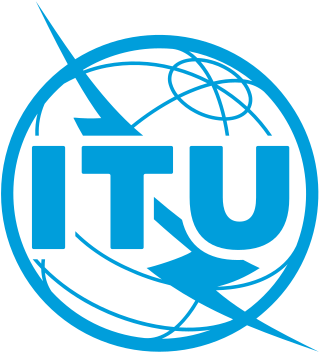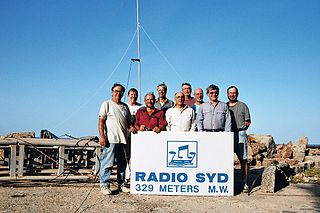
The International Telecommunication Union (ITU) is a specialized agency of the United Nations responsible for many matters related to information and communication technologies. It was established on 17 May 1865 as the International Telegraph Union, significantly predating the UN and making it the oldest UN agency. Doreen Bogdan-Martin is the Secretary-General of ITU, the first woman to serve as its head.
The International Telecommunication Union (ITU) allocates call sign prefixes for radio and television stations of all types. They also form the basis for, but may not exactly match, aircraft registration identifiers. These prefixes are agreed upon internationally, and are a form of country code. A call sign can be any number of letters and numerals but each country must only use call signs that begin with the characters allocated for use in that country.
Telecommunications in Western Sahara include radio, television, fixed and mobile telephones, and the Internet.
Automatic Link Establishment, commonly known as ALE, is the worldwide de facto standard for digitally initiating and sustaining HF radio communications. ALE is a feature in an HF communications radio transceiver system that enables the radio station to make contact, or initiate a circuit, between itself and another HF radio station or network of stations. The purpose is to provide a reliable rapid method of calling and connecting during constantly changing HF ionospheric propagation, reception interference, and shared spectrum use of busy or congested HF channels.

The (International) Radiotelephony Spelling Alphabet, commonly known as the NATO phonetic alphabet, is the most widely used set of clear code words for communicating the letters of the Roman alphabet. Technically a radiotelephonic spelling alphabet, it goes by various names, including NATO spelling alphabet, ICAO phonetic alphabet and ICAO spelling alphabet. The ITU phonetic alphabet and figure code is a rarely used variant that differs in the code words for digits.

The Q-code is a standardised collection of three-letter codes that each start with the letter "Q". It is an operating signal initially developed for commercial radiotelegraph communication and later adopted by other radio services, especially amateur radio. To distinguish the use of a Q-code transmitted as a question from the same Q-code transmitted as a statement, operators either prefixed it with the military network question marker "INT" or suffixed it with the standard Morse question mark UD.
The American Radio Relay League (ARRL) is the largest membership association of amateur radio enthusiasts in the United States. ARRL is a non-profit organization, and was co-founded on April 6, 1914, by Hiram Percy Maxim and Clarence D. Tuska of Hartford, Connecticut. The ARRL represents the interests of amateur radio operators before federal regulatory bodies, provides technical advice and assistance to amateur radio enthusiasts, supports a number of educational programs and sponsors emergency communications service throughout the country. The ARRL has approximately 161,000 members. In addition to members in the US, the organization claims over 7,000 members in other countries. The ARRL publishes many books and a monthly membership journal called QST.

A DX-pedition is an expedition to what is considered an exotic place by amateur radio operators and DX listeners, typically because of its remoteness, access restrictions, or simply because there are very few radio amateurs active from that place. This could be an island, a country, or even a particular spot on a geographical grid. DX is a telegraphic shorthand for "distance" or "distant".

The International Amateur Radio Union (IARU) is an international confederation of national organisations that allows a forum for common matters of concern to amateur radio operators worldwide, and collectively represents matters to the International Telecommunication Union (ITU). The International Amateur Radio Union was founded in 1925 and, as of July 2021, it is composed of 172 national member societies.
PACTOR is a radio modulation mode used by amateur radio operators, marine radio stations, military or government users such as the US Department of Homeland Security, and radio stations in isolated areas to send and receive digital information via radio.

Amateur radio international reciprocal operating agreements permit amateur radio operators (hams) from one country to operate a station whilst traveling in another without the need to obtain additional licenses or permits.
A spelling alphabet is a set of words used to represent the letters of an alphabet in oral communication, especially over a two-way radio or telephone. The words chosen to represent the letters sound sufficiently different from each other to clearly differentiate them. This avoids any confusion that could easily otherwise result from the names of letters that sound similar, except for some small difference easily missed or easily degraded by the imperfect sound quality of the apparatus. For example, in the Latin alphabet, the letters B, P, and D sound similar and could easily be confused, but the words "bravo", "papa" and "delta" sound completely different, making confusion unlikely.
The World Administrative Radio Conference (WARC) was a 1979 technical conference of the International Telecommunication Union (ITU) where delegates from member nations of the ITU met to revise or amend the entire international radio regulations pertaining to all telecommunication services throughout the world. The conference was held in Geneva, Switzerland, with preparatory conferences held in Panama City, Panama.
Call signs in the Middle East are unique identifiers for telecommunications and broadcasting in the Middle East. Call signs are regulated internationally by the International Telecommunication Union (ITU) and nationally by local government and international agencies in Israel, Jordan, Lebanon, Syria, The Palestinian Authority, occupied territories and other nations or DXCC entities.
Amateur radio call signs in Africa are codes used to identify all radio communications, broadcasts and transmissions. The International Telecommunication Union assigns Africa as ITU region #1. It has assigned call signs prefix blocks to countries including 77 DXCC entities in and off-shore of Africa. Western Sahara is not a DXCC entity but uses SØ as a prefix.
Amateur radio call signs are allocated to amateur radio operators around the world. The call signs are used to legally identify the station or operator, with some countries requiring the station call sign to always be used and others allowing the operator call sign instead.
Call signs in Korea are unique identifiers for telecommunications and broadcasting on the Korean peninsula. Call signs are regulated internationally by the ITU as well as nationally in South Korea by the Korea Communications Commission in the Ministry of Information and Communication. Not much is known outside of North Korea how amateur radio is regulated, although a foreign amateur was asked to appear before the "Radio Regulation Board" in 2002. Also, North Korea's Cultural Relations with Foreign Countries recently issued an operating permit, which was countermanded by the Ministry of Telecommunications and Posts.
Call signs in Oceania are currently voluntary in Australia radio and TV station, and were previously compulsory in New Zealand. In both countries, stations like 2GB and Newstalk ZB continue to use parts of the call signs in their branding.
Call signs in United Kingdom include a three letter country code, and a series of letters and numbers.

Doreen Bogdan-Martin is an American diplomat and engineer, current Secretary-General of the International Telecommunication Union. She was elected at the 2022 ITU Plenipotentiary Conference in Bucharest, and as the first woman in the 157-year history of the ITU to become the Secretary-General. Previously, she was the first woman to become an Elected Official of the ITU, as the Director of the Telecommunication Development Bureau of the ITU.







